#Hotel Diplomat Stockholm
Explore tagged Tumblr posts
Link
Hotel Diplomat Stockholm Hotel Diplomat Stockholm offers an array of entertainment facilities to ensure a memorable and enjoyable stay for guests. Whether you're looking to unwind after a long day of exploring the city or indulge in some much-needed relaxation, this hotel has you covered. The bar at Hotel Diplomat Stockholm is the perfect place to start your evening. With its chic and sophisticated ambiance, it offers a wide selection of cocktails, wines, and spirits, making it the ideal spot to socialize with friends or enjoy a quiet drink alone. For those seeking ultimate relaxation, the hotel's massage and sauna facilities are not to be missed. Indulge in a rejuvenating massage to soothe tired muscles or unwind in the sauna to detoxify and de-stress. These facilities provide a blissful escape from the bustling city, allowing you to fully recharge and rejuvenate. If you're in the mood for a quiet retreat, the hotel's library is the perfect spot. Curl up with a book from their extensive...
0 notes
Text
⋆𖥧˚𖤣*ꕤ Viparyas ꕤ*𖤣˚𖥧⋆
Read my Yandere! Capitano fics first (´∀`*)
Herbarium ๑ Fairytale ๑ Other fics
A long time ago, I thought of a silly Yandere! Capitano x Damsel! Darling scenario, this time featuring the Aranara. Aaand now we have yet another epilogue to their twisted fairytale xD
Thank you so much to @jymwahuwu for inspiring me to finally write this fluffy idea and @diodellet for beta-reading this <3
Tw:: yandere, captivity, Stockholm Syndrome, mention of abuse from Darling’s backstory
Note:: Fem reader who is smaller and weaker than Capitano, spoilers for previous fics
♡ 0.8k words under the cut ♡

The first and last time ______ tried to “escape” from Capitano happened during their unofficial honeymoon in Sumeru.
In all of their nature tours, she has encountered the same…forest creatures? Whatever they are, they are small. Whimsical. Quick to disappear once they sense her gaze. What’s most mysterious is that Capitano and the Fatui are unable to see them.
She stops mentioning them after the third sighting. Clinics aren’t a popular tourist spot, and their leisure time is already cut short by the real purpose of the trip, namely Capitano’s diplomatic mission. If not for her guard’s betrayal, ______ wouldn’t even be here with him.
During his diplomatic negotiations, she stays in their hotel room, unable to interact with anyone except the Fatui agents stationed all over the building. Usually, she passes the time by reading her new books. But one day, towards the end of the mission, she goes to the balcony for fresh air…and sees the forest creatures foraging in the clearing behind the hotel.
Well, it makes sense. They did book a secluded hotel in Dharma Forest.
It seems that this group is more trusting of humans, seeing how they cheerfully called out to her and flew up to the balcony. As it turns out, their species is called the Aranara, and they can only be seen by children and certain adults. They seem friendly.
They invite her to their village, with the promise of flowers and stories. Their offer is tempting, considering the weeks she has spent in constant surveillance and confusion over the Aranara. They even help her leave the hotel undetected!
Vanarana is quite nice and so are her new companions. They sing to her, tell her their stories, and even help her pick flowers. ______ is silent for the most part, but she does express her appreciation with headpats and small smiles.
They are pleasant company, really. And that is why, amidst their lighthearted interactions, ______ can’t help but think: Had she been raised in Sumeru, could she have found solace in the Aranara? If that were the case, would she have settled for Capitano’s love?
A few hours later, she decides it is time to return to her husband. So she thanks the Aranara one last time and accepts the flower crown they made for her. As she leaves Vanarana, her newly-pressed Viparyas transform into regular Padisarah.
Unfortunately, she underestimated the consequences of her actions. In less than a minute, ______ is accosted by a frantic Fatuus and escorted back to the hotel.
As it turns out, while she was enjoying the Aranara’s company, the Fatui have been searching for her all over Sumeru. Their panic only worsened when Capitano finished his meeting and began looking for her.
It has been a long time since she has feared her husband’s wrath. Despite everything they’ve been through, how can she be sure that he won’t punish her this time?
This time, her guards are stationed inside her hotel room. Soon, all of them including ______ are alerted by a familiar set of footsteps. Capitano opens the door and dismisses the guards.
The tension is unbearable. There are no harsh words, no physical violence, but it is clear that he wants answers from his wife. And a part of her feels guilty for making him worry about her safety again, moreso when he asks if he has done anything to make her feel neglected in Sumeru.
So she tells him about the Aranara. She hands over her flower crown for inspection. She swears that she won’t do it again, that she wasn’t assisted by any Fatui traitors, that she only went to Vanarana out of curiosity and not for the purpose of leaving him.
They made a promise on the first day of their honeymoon, didn’t they? That if she ever runs away, he’d capture her immediately?
She doesn’t know how to feel when her husband’s touch becomes gentle. When he apologizes for scaring her. When he says that he believes her story.
Later that night, when ______ takes out her notebook, she flips to the page of Sumeru roses she’d preserved for him. The flowers need a few more days.
The next day, they continue their travels in Sumeru. ______ stops acknowledging the Aranara apart from subtle glances. The forest spirits can only question the increase in Fatui guards, the new locks on the balcony, her husband’s tight grip around her waist.
She is also forbidden from telling anyone about her experience with the Aranara, especially Il Dottore.
✿ BONUS ✿
Fatui:: WHERE ON EARTH IS LADY ______?!! WHAT KIND OF DANGER COULD SHE BE IN?!! OH MY GOD THE CAPTAIN IS GOING TO KILL US IF WE CAN’T FIND HER!! T0T
~Meanwhile~
Aranara:: We should cheer up Sad Nara with the Taste of Happiness!! >:0
Darling:: …Thank you for the dessert.
♡
First Laurestine, now this…….how many old brainrots are going to be written now that Capitano is in the Main Story?? This drabble turned out longer than expected, but it was fun to think about Damsel bonding with the Aranara + another soft moment with Capitano + the Fatui’s panic. I think Seelies would also take a liking to her and her husband (●´ω`●)
Tag a Capitano enjoyer!! @leftdestiny-posts @brynn-lear @zhongrin @euniveve @naraven @harmonysanreads @stickyspeckledlight @ainescribe @tylerxrbtwhp @whispereons
#capitano#il capitano#capitano x reader#yandere capitano x reader#yandere capitano#yandere fatui harbingers#fatui x reader#genshin x reader#yandere genshin#tw: yandere#tw: dark#fem reader#jessamine-writing
333 notes
·
View notes
Text
Jag väcktes i mitten av natten av smärtan i handen. Den hade börjat sträcka sig från fingertopparna till axeln, det är nerven som är klämd förklarade läkaren. Du har fått karpaltunnelsyndromen sa han och hans blick var stilla. Jag vet inte om jag någonsin kommer att vänja mig vid den stillheten i ansiktet, i hela kroppen hos svenskarna. Jag känner igen fransmännen i Stockholm för de tittar på allt och alla med orolig blick, stirrar sedan vänder sig om, som om de var förföljda av ett spöke, de ser rädda ut.
Läkaren var fortfarande brun från sin semester i den franska rivieran trots att det var oktober, den fula vita läkaruniformen passade honom förvånansvärt bra och hans förnamn lät lite franskt trots att han hette Andersson i efternamn. Det verkar vara en grej i den delen av stan, alla är liksom besatta av Frankrike och jag behandlas bättre än andra för att jag heter Valentine och har en brytning. Häromdagen ringde min mamma när jag stod i kö på ICA Roslagstull och den snygga blonda kassörskan tappade plötligt sin resting bitch face, log mot mig och gav mig rabatt för något som skulle gå ut 5 dagar senare. Allt jag behöver göra är att babbla på franska i telefon och hela Östermalm bugar sig för mig men de hör inte att jag har en bonnig dialekt.
Jag väckte A som gick upp och gav mig en Alvedon, det har blivit en vana hos oss, en liten koreografi som upprepas varannan dag: jag vaknar i mitten av natten och har ont, han går upp och ger mig en Alvedon och sedan somnar vi om. Hans väckarklocka ringde 2 timmar senare och han gick upp och jag låtsades sova för att anledningen till att han ställt väckarklockan 8:30 på en söndag var att han skulle göra mig frukost och ta ut de presenter han gömt i skrivbordslådan när han trodde att jag inte såg. Det var min trettioårsdag och jag låg där och blundade och lyssnade på allt han gjorde. Efter fem minuter kom ångesten och jag började röra på mig, satte mig i sängen men han sa nej, sov, en kvart till bara.
Vi åt en liten frukost och mina föräldrar ringde, och min gudmor ringde, och 50% av min släkt smsade, sedan promenerade vi till Humlegården och åt lunch på ett franskt ställe där ägaren har en moustache och ser misstänksamt på alla de som kommer in men han går undan med att vara borderline otrevlig för han ser fransk ut. Bredvid oss satt ett franskt par och jag frågade dem om de var här på besök, nej de var här för jobbet och de bodde på hotel Diplomat och det syntes. I vanliga fall hade jag inte försökt prata med sådana parisianska finansmänniskor men den dagen hade jag tvättat håret och hade på mig min ulltröja från DAY by Birger et Mikkelsen och min Malene Birger svarta kappa. Jag har liksom blivit besatt av de danska modemärkena och har alltid ett paket på väg från något outlet företag. Ingenting känns sorgligare än att gå ner till den paketboxen och hämta mina rabatterade danska kläder. BankID, bluetooth, bekräfta hämtning, tyst för mig själv upprepar jag: "det är en investering".
Dagen efter började rynkorna plötligt synas på mitt ansikte, jag lovar, jag kan inte längre lägga eyeliner runt ögonen för den rinner direkt in i rynkorna. Som varje morgon gick jag gick ner till Pressbyrå och köpte kaffe och där stod en kvinna (tjej?) med sådana rynkor vid ögonen och tittade på frallorna. Hon hade försökt dölja rynkorna med orange foundation så att de syntes ännu mer och hade på sig en trench coat från Bershka. Jag drog slutsatsen att hon var född 92.
Det är något med oss som är födda mellan 90 och 95. Vi styr inte längre utseendevärlden, vi ramlade 2018 och har sedan dess legat där i diket med våra high waisted jeans. Ser på grunge fairycore snyggingar passera, de ser inte på oss. Några av oss har inte slutat sminka sina ögonbryn, har liksom blivit missbrukare. Springer mot Anastasia-pennan som alkoholister springer mot flaskan. Vi blev inte inkluderade i årets 2009-mode-revival för vi tar sociala medier på allvar och följer konton som heter typ juliafashionblog. Jag önskar att jag kunde vara med i 2009-trenden men det krävs ironi, ett slags avståndstagande, för att cosplaya en anorektiker-emo utan att egentligen ha ätstörningar.
16 notes
·
View notes
Text

•|•|•|•|•|•|•|•|•Patti Smith, Hotel Diplomat, Stockholm – October 3, 1976. Photo by Torbjörn Calvero.
0 notes
Photo

32 notes
·
View notes
Photo
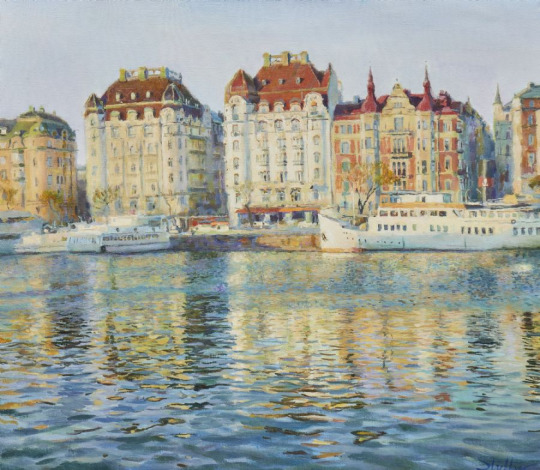
Hotel Diplomat, Strandvägen . Stockholm - Nadezda Streltsova
Swedish, b. 1973 -
Oil on canvas , 65 x 75 cm.
116 notes
·
View notes
Text




Pre-gaming
1 note
·
View note
Text

Kelly Gale & Joel Kinnaman's Getaway — Vogue Scandinavia 2022 Aug/Sep Issue
“We had some real, underlying issues”: Joel and Kelly on the realities of a very modern, Hollywood romance
By Allyson Shiffman
August 16, 2022
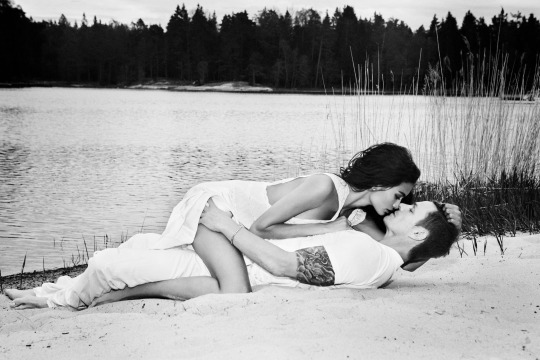
Photo: Ellen von Unwerth
Joel Kinnaman and Kelly Gale can’t keep their hands off each other. Outrageously attractive and unabashedly in love, the recently-engaged Swedish power couple are a fairytale come to life. But, as it turns out, the road to happily ever after was filled with plot twists, obstacles and a proposal that played out considerably different from how it appeared on Instagram. Ellen von Unwerth captures their steamy love story at the Kinnaman’s country house for Vogue Scandinavia's anniversary issue
Joel Kinnaman and Kelly Gale are lying on a small patch of beach two hours north of Stockholm, kissing. It is a moment so intimate, it appears they have forgotten the 10 or so onlookers and the snap of photographer Ellen von Unwerth’s camera. “I almost feel embarrassed to watch,” remarks our fashion assistant. One bystander, however, is unbothered; Zoe, Joel and Kelly’s rescue dog, saunters into the scene and plops down on the beach directly between the couple and the camera, her wagging black tail whomping Kelly in the face.
On the drive home from the Kinnaman’s summer property, a vast plot of seaside land with several structures and enough beds to house an expanding family, the entire Vogue Scandinavia team will remark on the magic of this couple. So wildly attractive, so unabashedly in love and so prepared to embark on their next chapter – marriage, children, further career milestones.

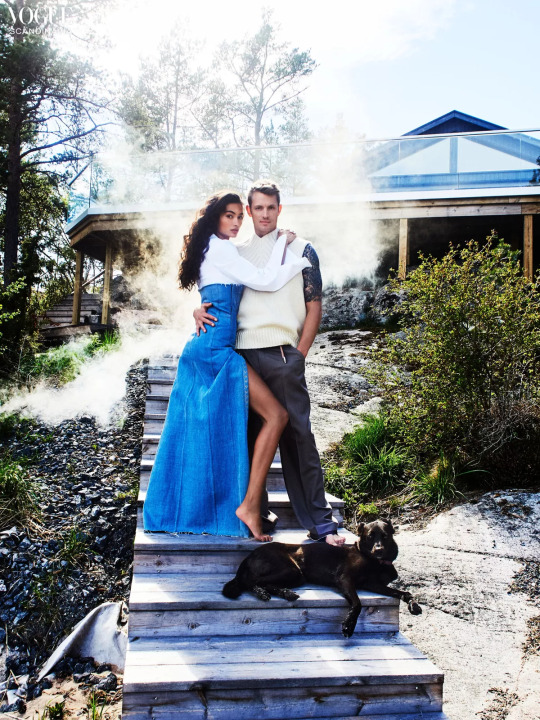
“Are we going to tell the real story?” Kelly asks Joel with a grin when I inquire about their engagement, announced via Instagram early last year. A couple of weeks have passed since our cover shoot at the country house when Joel, Kelly and I meet for lunch in a private suite at Stockholm’s Diplomat Hotel. During the five or so minutes that we wait to be let up, Joel receives a hello and a fist-bump from an acquaintance in the lobby - proof that though he now lives in Malibu, he will always be a Stockholm boy.
We enter the suite and the 42-year-old actor places his Acne Studios shopping bag by the door (“Kelly got a jacket”) and we settle in around the dining room table. It began, as many modern romances do, with a DM. “It went down in the DMs,” Joel sings, referencing the 2016 Yo Gotti hit. It was not a move that typically worked on the 27-year-old who, as a Victoria’s Secret model, was accustomed to receiving messages from well-known bachelors. “Usually I would go in and see that the guy follows all of the Victoria’s Secret models,” she says. “But I went on his profile and he was only following me and, like, 100 people.” The only person they had in common was Barack Obama. “I passed the first test,” says Joel, proudly.
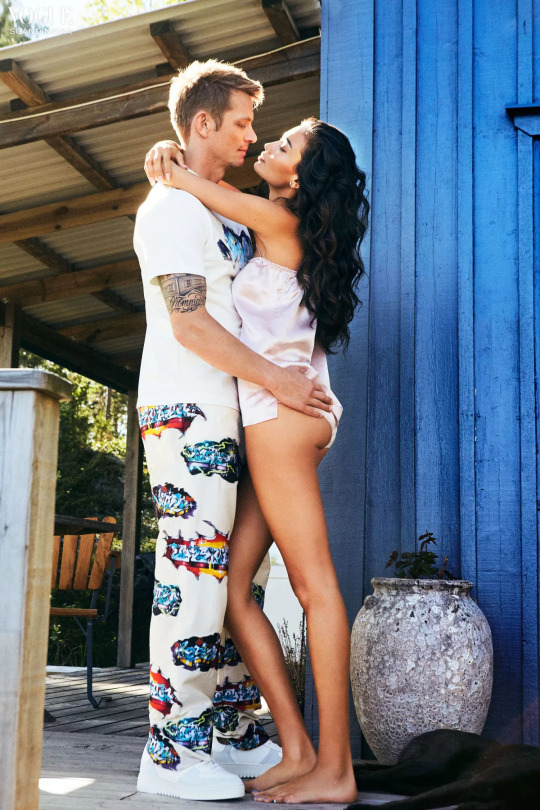
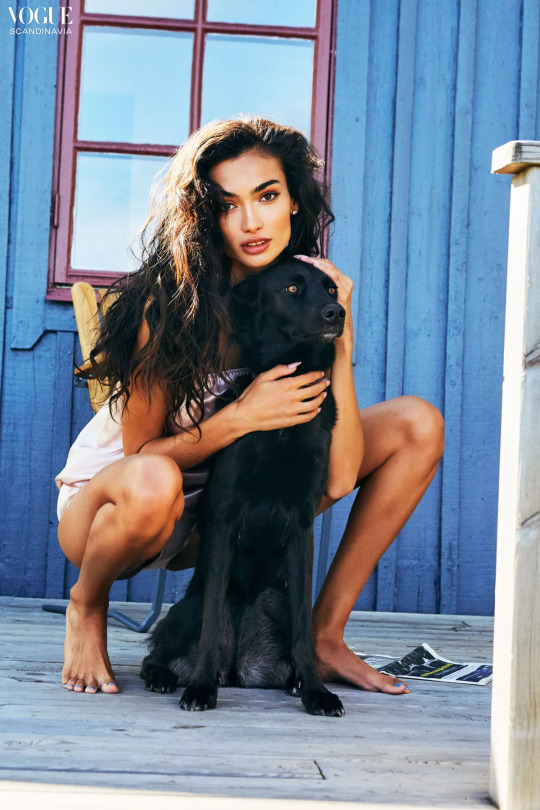
Seven months later, after one failed attempt to get her to join him at a UFC fight in New York, Joel managed to take Kelly on a sushi date in Los Angeles... sort of. “It was a little bit weird, because I had been trying to get out of my current relationship for a while,” Kelly says. It was an on-again-off-again situation with a guy she had been with since high school. So she assured herself that it wasn’t a date, that they were just “two people meeting up.” They didn’t even hug, but the chemistry was there.
The second meet-up was a hike in Malibu. “And then I got a hug,” says Joel, before quickly correcting himself. “Well...I didn’t get a hug, I gave her a hug.” Kelly interjects, “You tried to kiss me.” Joel was all in – he had already brought up the notion of having kids. When Kelly returned to New York, she officially called things off with her boyfriend.

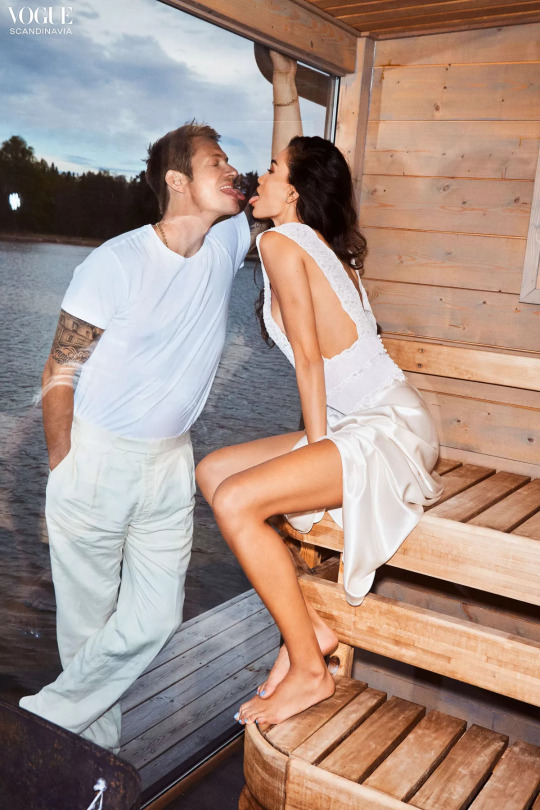
Both Kelly and Joel came to be born in Sweden via unusual circumstances. Kelly’s mother was born in India and adopted by a Swedish family as a child. She met Kelly’s father, an Australian, while travelling in Thailand and returned with him to Gothenburg to start their family. “I honestly haven’t spent that much of my life here because we lived in Ghana for several years of my childhood,” Kelly explains. At 12, she was spotted by a model scout and shortly thereafter she was travelling the world. She walked her first Victoria’s Secret runway in 2013.
As for Joel, his American father, Steve Kinnaman, was drafted into the military during the Vietnam war. While stationed in Bangkok, befriending Europeans for the very first time and even attending the wedding of a half-Vietnamese bride, he couldn’t shake the nagging feeling that things didn’t “seem right.” When Steve received his orders to be shipped into combat, he decided he “wasn’t going to participate in the war.”
He burned his passport and went on the run, eventually escaping to Sweden and applying for political asylum. “And then he met my mum and they started a family,” Joel says. Today Steve and Bitte Kinnaman live full-time at the family summer house. On the day of our cover shoot, they warmly greeted our team, even offering up bathing suits to borrow in case anyone wanted to take a swim after we wrapped.
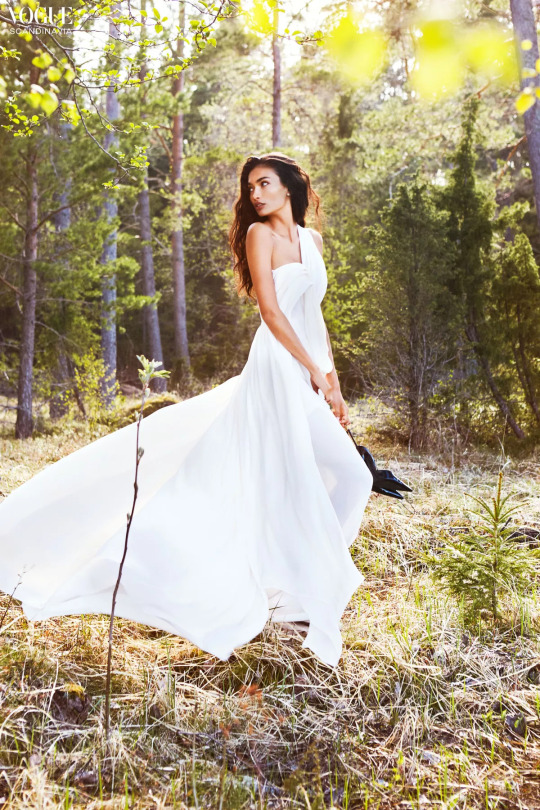

A knock at the door indicates lunch has arrived. Steamed white fish and veggies for both Joel and Kelly. “He’s on my Victoria’s Secret diet right now,” says Kelly, a self-described foodie and armchair nutritionist. Joel is preparing for a role that requires him to shed all his hard-earned muscles. I ask him how it’s going. “Oh, it’s miserable,” he says. “Luckily he never saw me get ready for the Victoria’s Secret show, or we would not have been a couple,” says Kelly.
Kelly was a “completely different person from now” on her first non-date with Joel. Gregarious and easy-going by nature, Joel loosened her up – taught her to enjoy life more. Brought out her goofy side. “I think it was her competitiveness and her professionalism that was getting in the way of everything,” he says, turning to Kelly. “You kind of realised that maybe you didn’t want to sacrifice everything for your career. It was sort of like...it’s not all going to fall apart if you have a little bit of this or try doing that. If you don’t allow yourself to try different things and see what you like and don’t like, what’s it all for?”

Kelly had gone from a “strict” household (her word) to a strict career. “It was very much ‘this is right and this is wrong’,” she explains. When she began pursuing modelling, the people around her were not entirely supportive, suggesting that she would fail or turn to drugs. Her competitive nature drove her to prove them dead wrong, to “never do a drug” and “never drink.”
As she describes it, she set up strict rules and boundaries for herself, so she could succeed in the competitive modelling landscape while protecting her mental and physical health. But then came Joel, who operates in shades of grey – open to experiences and various ways of seeing things. A no-bullshit, heart on his sleeve kind of guy (his mum is a therapist). It was refreshing and unexpected. “I was never gonna end up with some one with tattoos,” she says. Now she wants one herself – a homage to the couple’s two rescue dogs.


Joel is no stranger to a career-oriented physical transformation, current diet inclusive. He’s gone big and buff as Rick Flag in Suicide Squad and Takeshi Kovacs in Altered Carbon and gaunt and pale as a tweaker-turned-detective in The Killing. For Joel, discovering acting was somewhat of a revelation. “I didn’t grow up thinking I was going to amount to much and I wasn’t really good at anything,” he says.
“It felt like all of a sudden, life had meaning in a way and it was a purpose and a goal. So when I started doing my first characters, I was prepared to be very self-destructive to get to where I needed to be.” Fulfilling the old school perception of the tortured artist, Joel was ready and willing to “embrace the darkness” if that’s what was called for.
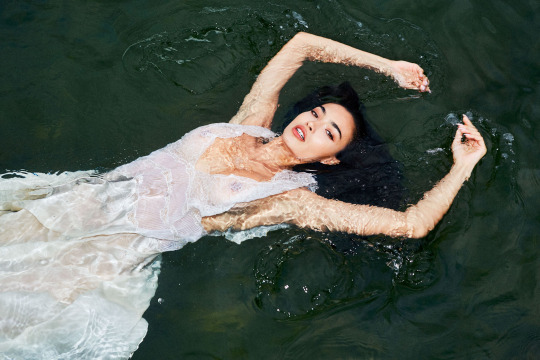
These days he approaches things differently, drawing from personal experience without spiralling into depression or bouts of anxiety. “If I’m playing someone that’s an alcoholic, I don’t have to go on a six-week bender,” he says. When I ask if he’s referring to a specific role, he admits that he’s “dabbled in stuff that has been connected to a character,” mentioning The Killing specifically. “But wasn’t he, like, a meth addict?” I ask. “Yes,” he responds. Next up, Joel will play a revenge-seeking father in the John Woo-directed Silent Night. Presumably, no revenge was taken in preparation.
Lately Kelly has caught the acting bug as well. She had done theatre as a kid, but when modelling “took over” she abandoned the idea of acting, even as major self-tape requests came rolling in. She was asked to tape for Zendaya’s role in Dune, but she didn’t get around to it because she “didn’t want to send in a half ass tape or do a shitty job.” The audition request, however, coupled with the lack of model-related travelling during the pandemic, spurred her to dive into acting with signature dedication, working with a coach and self-taping obsessively.


“It’s a lot of work though, for me,” says Joel. “I’m captain self-tape at this point.” Kelly interjects, “He wants to direct, so it’s perfect.” The long hours have paid off – Kelly stars in forthcoming action film The Plane opposite Gerard Butler as well as a Netflix film, Uglies. “Now I’m prepared and ready to audition for Dune 2 instead,” she adds.
With their careers and relationship thriving, there was only one thing left to do: get engaged. Judging by their celebratory Instagram posts, the charming proposal anecdote recounted by Joel on The Tonight Show with Jimmy Fallon and that big, beautiful ring, it looked from the outside like the engagement played out like a fairytale (save for the fact that they nearly got arrested for hiking on private property in Hawaii). But here it comes – the aforementioned “real story”.
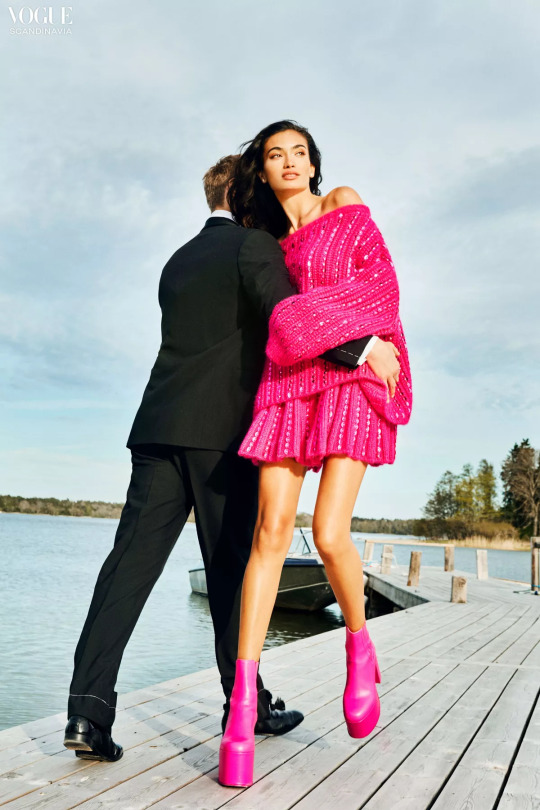
“I had said to Joel three weeks earlier that I am not ready to get married,” says Kelly. She had been saying it for months, in fact, repeatedly. She had told her friends and family that she was not ready for an engagement. She said that if Joel were to ask for their blessing or for assistance picking out a ring, that they were to stop him. She wanted to get engaged, just maybe “six months later.” Joel figured she didn’t really mean it. “Well, you don’t decide when I propose,” he told her.
Kelly’s response? “Well, you don’t decide the answer.” In January 2021, without consulting anyone, Joel bought a ring and planned the cinematic sunrise proposal. “I said yes, but I was kind of pissed,” Kelly says, adding, “It would have been so awkward if I had said no.”
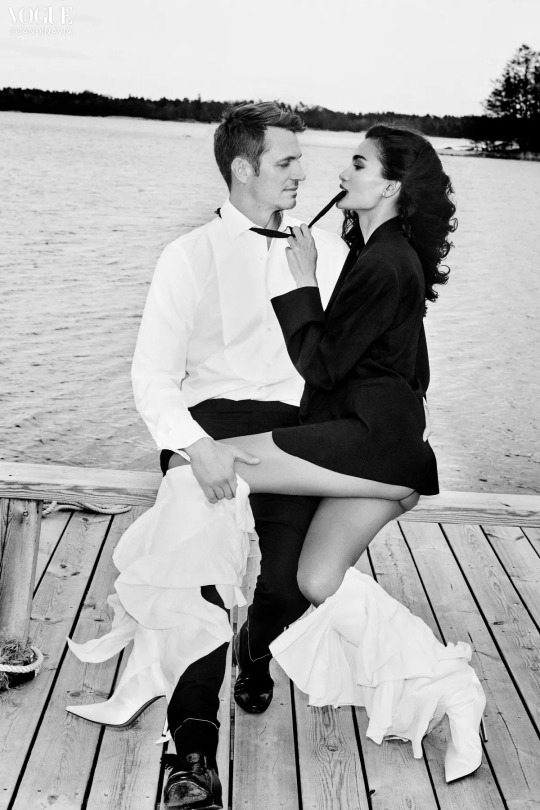
After the engagement, Kelly felt “confused.” “I started Googling ‘sad after engagement’,” she says (as it turns out, it’s “a thing”). Given that she’s a moderate-sharer on Instagram, she felt obligated to post some thing romantic to commemorate the moment. “Yours forever,” she wrote beneath a selfie of her and Joel kissing, the ring centre stage. Now the whole world thought they were happily engaged, but things at home were still “weird”. “We had some real, underlying issues,” Joel now admits. “Like, foundational issues in our relationship that we hadn’t solved.”
He knew things weren’t perfect – what relationship is? – but he saw the engagement as a “doubling down.” The sort of guy to face things head on, Joel figured once they got engaged, all of the “heavy shit” between them would work itself out. “For me, it was like, I want this relationship to work. I want Kelly, I love her,” he says. Ever the pragmatist, Kelly wanted to solve their problems first, before committing to spending the rest of their lives together. She stopped wearing the ring.

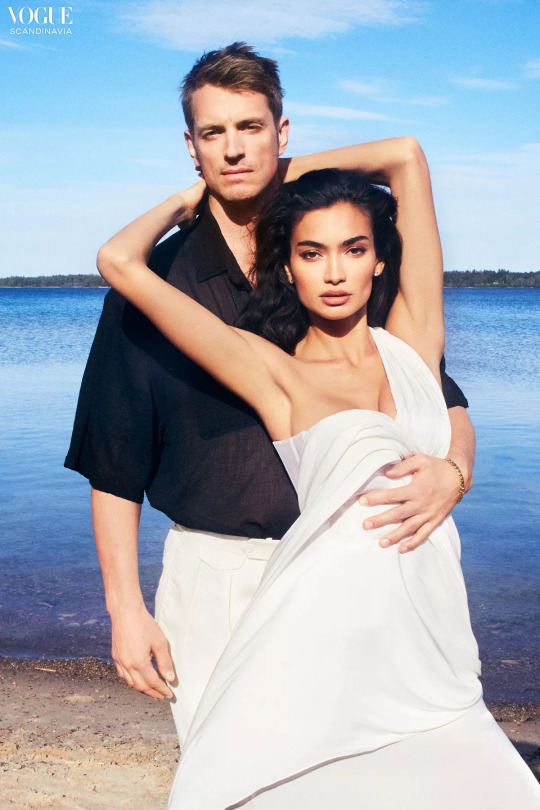
In hindsight, she credits the mistimed engagement to her and Joel working through their “shit”. The mistimed engagement, and therapy. Or rather, a coach, named Mark. “We f ***ing love this guy,” says Joel. “Everyone deserves a Mark in their life.” They saw him “once or twice a week for almost a month,” working through their “deeper shit”. Building a foundation. “It was really brutal and painful, but then we got through it and it was like...” Joel mimes his brain exploding. “It felt like our relationship really started,” says Kelly. They agree that now, three years after they first went for sushi, they are in their honeymoon phase. Today she’s wearing her ring.
These days they still see Mark, though less regularly. They have the confidence to get through the tough parts – to weather the sometimes-chaos of a full life spent together. “Mark asked us if we play tennis, which we do,” says Joel. “He taught us that in a relationship, you’re always playing doubles, on the same team.” “Now I want to get married,” says Kelly. She turns to Joel and says, sweetly, “I love you so much.”
youtube
Photographer: Ellen von Unwerth Stylist: Ursula Wångander Talents: Kelly Gale and Joel Kinnaman Hair Stylist: Karolina Liedberg Makeup Artist: Anya De Tobon Nail Artist: Aida Ahadpour Photographer Assistants: Nominoe Queinnec, Mattias Sätterström Stylist Assistant: Amelie Langenskiöld Digital Operator: Gustaf Hagstrand Production: Kornelia Eklund Production Assistant: Anton Nilsson, Rebecka Thorén

55 notes
·
View notes
Photo

Hotel Diplomat Stockholm Inst @fakerstrom
550 notes
·
View notes
Photo

🍔 Review № 516 ━ 📍 Hotel Diplomat ★★☆☆☆ • The exclusive Hotel Diplomat is located on Strandvägen in Stockholm's Östermalm district. The hotel has a grand restaurant with classic dishes, and among them we found a burger called Diplomat Burger. It cost an eye-watering 295 SEK (32.5 USD) and contained caramelized onions, pickled onions, blue cheese from Hillsand and a smoked mayo. It also came with a bowl of french fries and a dip sauce. • The burger was neatly served on a plate, and looked surprisingly good and was nicely constructed. But there were a few problems apparent straight off the bat. First of all, it was really high, and we had problems eating it with our hands. But the bun was nice and squishy, and our first bite was pretty positive. the medium beef patty was really juicy and packed with flavours. The beef was definitely the highlight of our meal, and we were really off to a promising start. • But we soon started to run into some serious problems. The blue cheese was quite restrained in the beginning and worked really well with the sweetness from the caramelized onions, but a few bites in it completely dominated the meal and became excruciatingly overpowering. Everything just tasted of blue cheese after a while, which felt like a real shame considering the great beef quality. The burger itself also started to fall to pieces about half way through our meal, as the beef juices made the bottom bun super soggy. We ended up finishing our burger with a knife and fork, which is always a bit of a letdown. Neither the french fries nor the dip stood out, but they didn't offend either and were alright. • We know that a lot of people love the burger at Hotel Diplomat, and we kind of understand why. The beef was nothing short of amazing, but the overpowering blue cheese, unbalanced construction and high price-point make it difficult for us to recommend that you order their burger. ━ @hoteldiplomatsthlm #burger #burgers #burgertime #burgerporn #burgerdudes #burgerlovers #food #foodie #hamburger #hamburgare #stockholm #stockholmburgers #sthlm #sthlmburgers #🍔 #🍟 #🇸🇪 (at Hotel Diplomat Stockholm) https://www.instagram.com/p/CYimiMBjzwA/?utm_medium=tumblr
#burger#burgers#burgertime#burgerporn#burgerdudes#burgerlovers#food#foodie#hamburger#hamburgare#stockholm#stockholmburgers#sthlm#sthlmburgers#🍔#🍟#🇸🇪
11 notes
·
View notes
Photo




Through the Years → Princess Sofia of Sweden (60/∞)
29 November 2016 | Princess Sofia of Sweden attends a lunch on the theme of social entrepreneurship and sustainability at Hotel Diplomat in Stockholm, Sweden. (Photo by Michael Campanella/Getty Images)
7 notes
·
View notes
Text
Tuesday, April 27, 2021
Global defense spending (Foreign Policy) Global defense spending increased in 2020, despite a sharp downturn in the global economy, according to an annual report by the Stockholm International Peace Research Institute (SIPRI). Overall spending reached nearly $2 trillion, a 2.6 percent increase from the 2019 figure. Defense budgets in the Middle East fell by 6.5 percent, helped by a 10 percent cut by Saudi Arabia. The five biggest spenders—the United States, China, India, Russia, and the United Kingdom—all increased their defense spending in 2020.
Canadians avoiding hotel quarantines for air travellers fuel taxi boom on U.S. border (Reuters) U.S. taxi and limousine services are seeing a boom in business from customers seeking to enter Canada by land to avoid a restriction on international travel that applies only to air traffic. While both Canadian land and air travellers are required to take a test within three days of departure, and again on arrival, only those flying to Canada must spend up to three days of the country’s 14-day required quarantine period in a hotel. That has led to a surge of calls for taxi and limousine services from Canadians who fly through U.S. airports in states like New York and then cross over the land border. A taxi trip across the border can cost around $200 or $250 compared with a three-day hotel stay of more than C$1,200 ($961), Canadian travel insurance broker Martin Firestone said. With the Canada-U.S. land border mostly closed for more than a year due to the pandemic, and overall tourism down, the recent surge in business has come as a relief to some struggling taxi operators. Some Canadians ask to be driven home, while others take rides to the border, cross on foot and get another ride in Canada, drivers said.
Armed Groups Step Into Venezuela as Lawlessness Grows (NYT) They bring drinking water to residents in the arid scrublands, teach farming workshops and offer medical checkups. They mediate land disputes, fine cattle rustlers, settle divorces, investigate crimes and punish thieves. They’re not police officers, civil servants or members of the Venezuela government, which has all but disappeared from this impoverished part of the country. Quite the opposite: They belong to one of Latin America’s most notorious rebel groups, considered terrorists by the United States and the European Union for carrying out bombings and kidnappings over decades of violence. Venezuela’s economic collapse has so thoroughly gutted the country that insurgents have embedded themselves across large stretches of its territory, seizing upon the nation’s undoing to establish mini-states of their own. And far from fleeing in fear or demanding to be rescued by the authorities, many residents here in Venezuela’s borderlands—hungry, hunted by local drug gangs and long complaining of being abandoned by their government—have welcomed the terrorist group for the kind of protection and basic services the state is failing to provide. The insurgents “are the ones who brought stability here,” said Ober Hernández, an Indigenous leader on the Guajira peninsula next to Colombia. “They brought peace.”
Peru’s election (Foreign Policy) Left-wing candidate Pedro Castillo is heavily favored by Peru’s electorate ahead of the country’s June 6 presidential runoff, according to a recent poll; 41.5 percent of respondents backed Castillo in the Instituto de Estudios Peruanos survey, with his challenger Keiko Fujimori receiving only 21.5 percent support. Decisions surrounding the economy seemed to drive support for Castillo, with more than half of those expressing support for him saying they would support a total change to the country’s economic system. There is still a chance that the vote could be competitive: 34.7 percent of those surveyed wanted neither candidate or were undecided.
E.U. Set to Let Vaccinated U.S. Tourists Visit This Summer (NYT) American tourists who have been fully vaccinated against Covid-19 will be able to visit the European Union over the summer, the head of the bloc’s executive body said in an interview with The New York Times on Sunday, more than a year after shutting down nonessential travel from most countries to limit the spread of the coronavirus. The fast pace of vaccination in the United States, and advanced talks between authorities there and the European Union over how to make vaccine certificates acceptable as proof of immunity for visitors, will enable the European Commission, the executive branch of the European Union, to recommend a switch in policy that could see trans-Atlantic leisure travel restored. “The Americans, as far as I can see, use European Medicines Agency-approved vaccines,” Ursula von der Leyen, president of the European Commission, said Sunday in an interview with The Times in Brussels. “This will enable free movement and the travel to the European Union. She added that resumption of travel would depend “on the epidemiological situation, but the situation is improving in the United States, as it is, hopefully, also improving in the European Union.”
Italy’s Problem With School Dropouts Goes From Bad to Worse in Pandemic (NYT) Even before the pandemic, Italy had among the worst dropout rates in the European Union, and the southern city of Naples was particularly troubled by high numbers. When the coronavirus hit, Italy shuttered its schools more than just about all the other European Union member states, with especially long closures in the Naples region, pushing students out in even higher numbers. While it is too early for reliable statistics, principals, advocates and social workers say they have seen a sharp increase in the number of students falling out of the system. The impact on an entire generation may be one of the pandemic’s lasting tolls. Italy closed its schools—fully or in part—for 35 weeks in the first year of the pandemic—three times longer than France, and more than Spain or Germany. And experts say that by doing so, the country, which has Europe’s oldest population and was already lagging behind in critical educational indicators, has risked leaving behind its youth, its greatest and rarest resource for a strong post-pandemic recovery.
Virus ‘swallowing’ people in India; crematoriums overwhelmed (AP) With life-saving oxygen in short supply, families are left on their own to ferry people sick with COVID-19 from hospital to hospital in search of treatment as India is engulfed in a devastating surge of infections. Too often, their efforts end in mourning. On social media and in television footage, desperate relatives plead for oxygen outside hospitals or weep in the street for loved ones who died waiting for treatment. For the fourth straight day, India on Sunday set a global daily record of new coronavirus infections, spurred by an insidious new variant that emerged here. The surge has undermined the government’s premature claims of victory over the pandemic. The unfolding crisis is most visceral in India’s overwhelmed graveyards and crematoriums, and in heartbreaking images of gasping patients dying on their way to hospitals due to lack of oxygen. Burial grounds in the capital New Delhi are running out of space. Bright, glowing funeral pyres light up the night sky in other badly hit cities.
In leaked audio, Iran’s foreign minister laments interference by Revolutionary Guards (Washington Post) In leaked audio recordings made public Sunday, Iran’s foreign minister complained about interference by the Revolutionary Guard Corps in Tehran’s diplomatic affairs, including efforts to undermine the 2015 nuclear deal between Iran and world powers. The audio, which was released by the London-based Iran International news channel, came from a three-hour interview with the foreign minister, Mohammed Javad Zarif, that the channel said was conducted in March. Taken together, Zarif’s unvarnished comments and the fact the audio had leaked, highlighted the sharpening public rivalries within Iran’s political circles, as Tehran engages with global powers in a fresh attempt to revive the nuclear deal, and as Iranian elections approach. The leaked conversation was the latest salvo in what has become an increasingly caustic domestic Iranian debate over the nuclear deal, pitting “pragmatists” represented by Rouhani against a conservative camp wary of any engagement with the West. The factional fights are not a secret in Iran, which hosts political debates that are more expansive and vigorous than most countries in the Middle East.
3 notes
·
View notes
Text



4th April 2020 // The Princely family of Sweden leaving Hotel Diplomat in Stockholm after having breakfast together as a family (x)
#princess sofia#prince carl philip#prince alexander#prince gabriel#2020#swedish royal family#my upload
83 notes
·
View notes
Photo
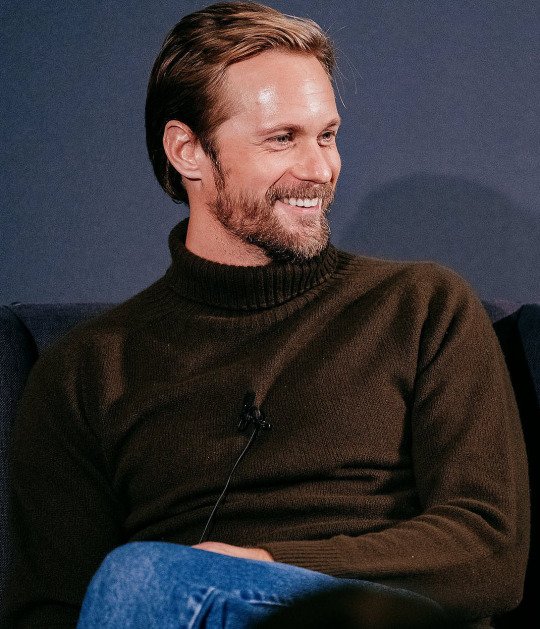
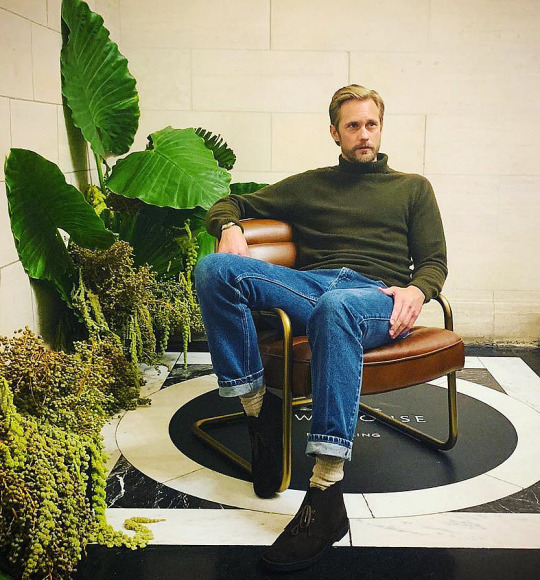
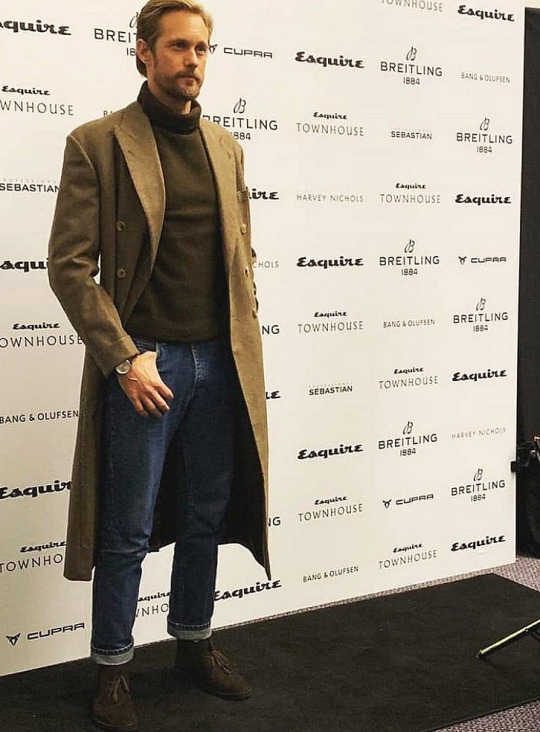
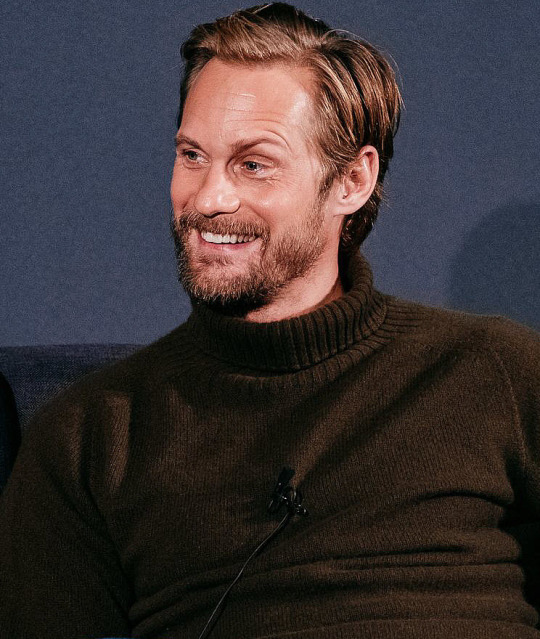
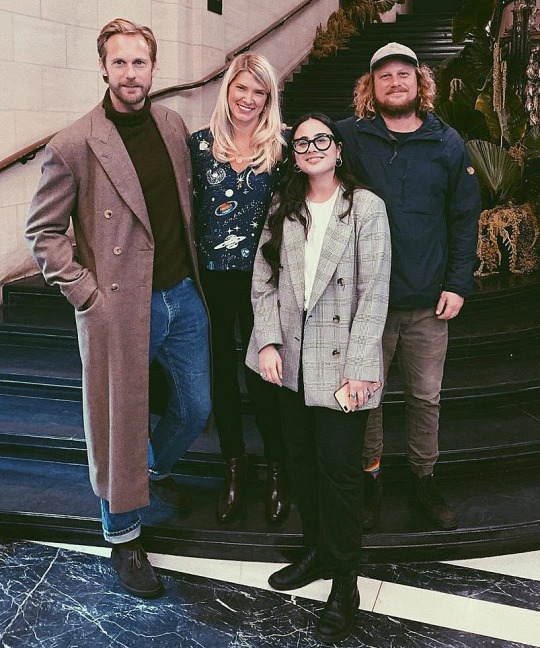
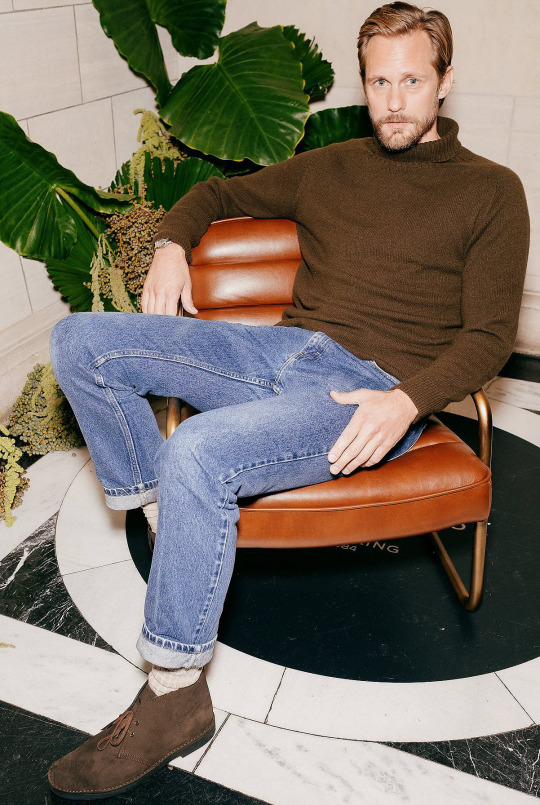
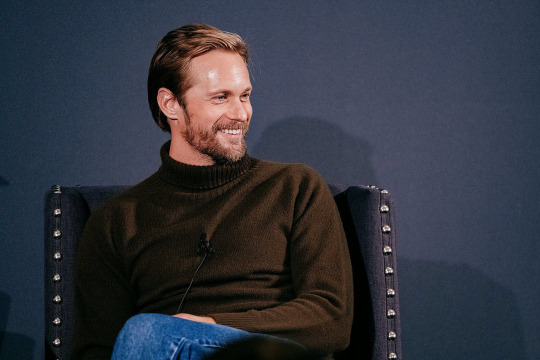
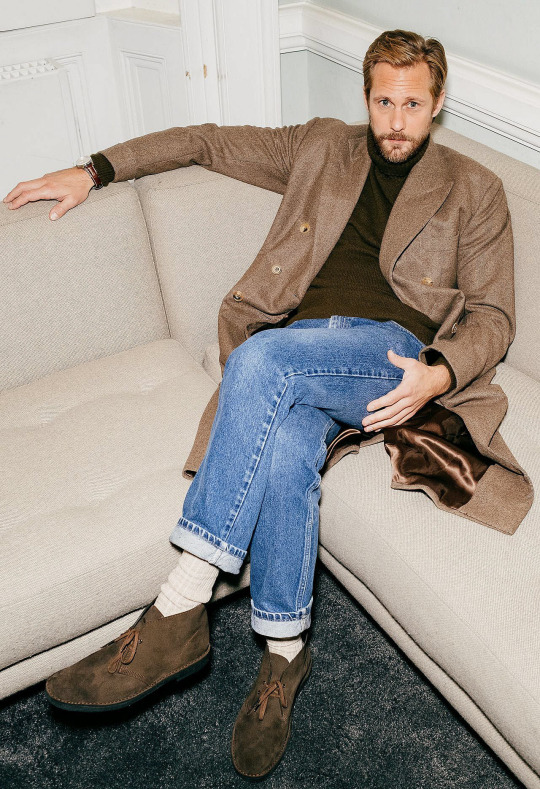
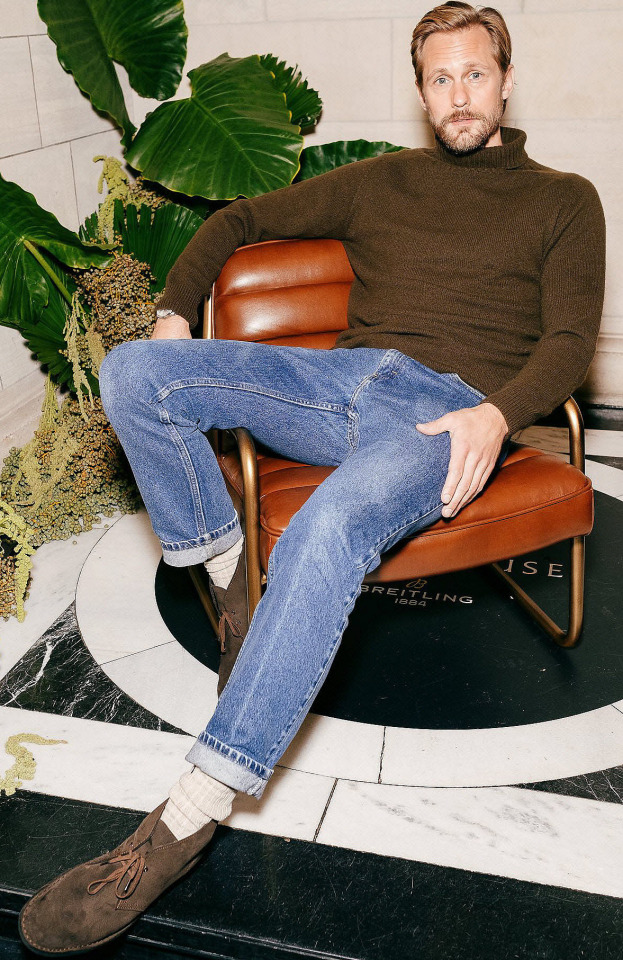
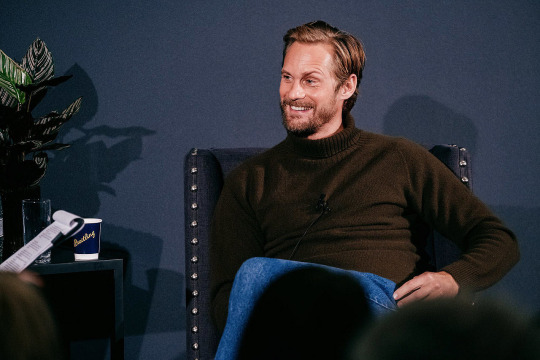
New Alex Interview with Esquire from his Q&A at their London Townhouse event (October 19, 2019)!
Alexander Skarsgård Isn’t Afraid Of The Dark
The Swedish actor won an Emmy and Golden Globe for his work on ‘Big Little Lies’, next up he takes on Stephen King’s infamous villain Randall Flagg, and tries to get Meryl Streep on board for 'Mamma Mia 3’
BY OLIVIA OVENDEN 23/10/2019
When Alexander Skarsgård was 20-years-old, he left his native Sweden and moved to Leeds, in the north of England. “It was important to avoid London because I was travelling with a friend and we wanted to get the quintessential English experience,” he revealed, during his on-stage talk last weekend,at the Esquire Townhouse in St James’, London.
If there was any doubt in the room as to how suited the Swedish heartthrob was to living in the student area of the city, it evaporated when they heard the joy with which he talked about Leeds’ most notorious pub crawl. “There’s this famous thing called the Otley Run,” he said, his voice warm with nostalgia. “I loved it.”
Alexander Johan Hjalmar Skarsgård grew up in Vällingby, Stockholm, the eldest son of actor Stellan Skarsgård, and spent his early years fantasising that his bohemian father was a regular dad who drove a Saab and worked a desk job.
At 13, his father’s friend cast him in the TV series Hunden som log (The Dog That Smiled), a fairly small Swedish production, but one that everyone he knew watched because of the few TV channels available. Skarsgård became uncomfortable with the level of fame it afforded him and decided to quit acting.
His father never pushed him to keep going or to capitalise on being recognised, something he is still grateful for. “He just said it was up to me, and that if I wasn’t loving it to do something else,” he says. “I would have listened if he’d said to stay in it, but that could have turned me off acting.”
Earlier that day, we meet at a private member’s club in London, where he arrives dressed in a cosy, walnut-coloured roll-neck, selvedge jeans and Clarks desert boots. The 43-year-old now lives in the East Village, New York, but flew here from Vancouver where he is currently filming The Stand, a TV adaptation of Stephen King’s novel.
It took seven years, a stint in the Swedish military and another stint mastering the aforementioned Otley run before Skarsgård returned to acting. His first big break came in 2008 when he played a 1000-year-old vampire in HBO’s True Blood, a show adapted from The Southern Vampire Mysteries novel series by Charlaine Harris. It was the height of vampire fever – the same year the film adaptation of Twilight was released – and Skarsgård’s portrayal of pallid, aquamarine-eyed Eric Northman spurned him legions of fans. Searching 'Eric Northman fan-fiction’ on Google brings up 81,500 results.
It was also the start of a fruitful partnership with between Skarsgård and HBO, a collaboration which hit a home-run when he was cast in Big Little Lies in 2017. The series, based on Liane Moriarty’s novel of the same name and starring Reese Witherspoon, Nicole Kidman, Shailene Woodley, Laura Dern, and Zoë Kravitz as three women living in Monterey, California.
Skarsgård plays Perry, the emotionally and physically abusive husband of Kidman’s character Celeste. To the outside world a handsome, sharply-dressed, romantic husband, but behind doors a monster who skulks around their house after her.
The show was widely praised for its nuanced and compassionate portrayal of domestic abuse, with Skarsgård’s performance going on to win an Emmy and Golden Globe amongst other plaudits for the series.
“The character had so much depth and inner turmoil that I never hesitated because it was dark,” he says. “I find it less interesting when an abusive husband is turned into a caricature: someone in a wife-beater with a beer on the couch screaming at his wife. It makes for more interesting story-telling if there are moments where you can see the person she fell in love with.”
He stayed with friends in Los Angeles while filming Big Little Lies, grateful to come back to a family’s home for dinner after shooting something so dark instead of returning to a lonely hotel room. After a run of Who’s Afraid of Virginia Woolf? at a theatre in Sweden early on in his career, he learned how to leave dark characters behind at the end of the day or else it “would just suffocate you”, saying that as a result he finds playing dark characters “quite cathartic”.
There is a kind of Nordic gloom to some of his characters, something that might be responsible for his being cast as Stephen King’s demonic villain Randall Flagg in The Stand, due to be released next year. Skarsgård says he grew up afraid of St. Bernard dogs after reading Cujo and still remembers going to see The Shining.
King’s writing is enjoying a rich second life in film and television at the moment, with books such as The Dark Tower and Pet Sematary released recently, and Doctor Sleep soon to follow. There’s also It, the Warner Brother’s reboot which features Skarsgård’s younger brother, Bill, as Pennywise the clown. Are they competing for who can terrify children more? “Randall Flagg is a very different character,” he says diplomatically. “He’s such a delicious villain [and] it’s fun to play someone who has that exuberance.”
He is strongly rumoured to be appearing in The Northman, teaming up again with co-star Nicole Kidman. He’s coy about the project when I ask, though says of Kidman that he, “can’t think of another actress I’d rather work with”, and later on stage speaks highly of Northman director Robert Eggers most recent film, the trippy The Lighthouse,
Whether or not it will return for a third season, Big Little Lies seems to have drawn a line under Skarsgård’s character, though the actor does have an idea for getting more time on set with Meryl Streep, who played Perry’s mother Mary-Louise in season two.“I think they should do season three and it’s all about Perry and his mother. Dad worked with Meryl on Mamma Mia 1 and 2 and had an amazing time,” he says, adding that he would ,“one hundred per cent” do Mamma Mia 3 for some more time on-set with Meryl.
Which leaves one more important matter to discuss: whether he’s familiar with the 'skarksbrow’, the internet’s fixation with him raising his eyebrow into a perfect arch. “No, no. This?” he says, before cocking it and smiling. “I’ve never heard of that.”
Alexander Skarsgård is an ambassador for Clarks
Sources: Article: Esquire.com (x), Photos: Esquire.com (x), jessejimzbrand instagram (x) and elisehamer instagram (x).
283 notes
·
View notes
Photo
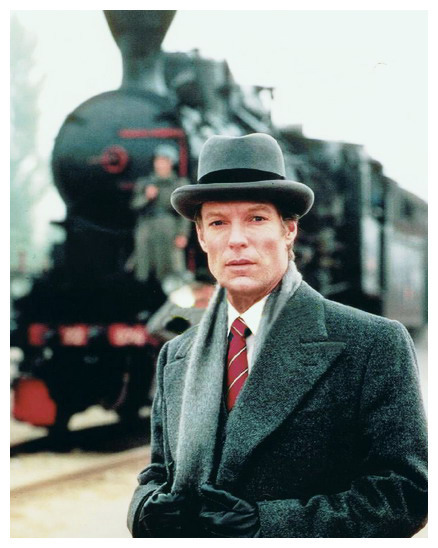
ALTERNATIVE STYLE ICON: RICHARD CHAMBERLAIN IN WALLENBERG: A HERO’S STORY
by Réginald-Jérôme de Mans
The writer George Santayana famously wrote that those who cannot remember the past are condemned to repeat it. Ironically many who repeat his quote forget who first uttered it.
I had long meant to write about Richard Chamberlain in this role. I once referred to him as “the fey king of the miniseries” and I don’t regret it: foppish, almost milquetoast in fare as varied as a two-part TV version of The Bourne Identity (with Jaclyn Smith, natch), Shogun, and as a leading candidate for an honorary Seinfeld puffy shirt: Not only did he play the Count of Monte Cristo in a 1975 TV movie, but a bunch of what Elaine Benes would have called chandelier-swinging characters in other Dumas adaptations, including Aramis in Richard Lester’s The Three Musketeers and Louis XIV and his twin in The Man in the Iron Mask. Postmodern swashbuckler author Arturo Perez-Reverte even described a character in one of his own novels as looking “like Richard Chamberlain in The Thorn Birds, only more manly.” That same Thorn Birds role, Father Ralph de Bricassart, also inspired a certain Rhunette Ferguson to give her son, a future New York Jets player, perhaps my favorite name ever: D’Brickashaw.
Dubbing Chamberlain an Alternative Style Icon for his role as Swedish diplomat Raoul Wallenberg is low-hanging fruit. For years this TV special dwelt at the bottom of my Netflix queue for that express purpose. Former Savile Row tailors Manning & Manning won an Emmy award for the outfits they made for him; decades later Bryan Manning had some very interesting things to say to the inimitable Simon Crompton of Permanent Style about the 1930s and 1940s cutting styles he had to adopt for Chamberlain’s outfits for the movie. Chamberlain’s costumes are appropriately dashing, from the full diplomatic gala white tie ensemble worn while conspiring with the Papal Nuncio of Budapest to a tan double-breasted suit with horizontal peaked lapels that is, quite simply, magnificent. Zagreb, one of the most beautiful cities in eastern Europe, admirably filled in for 1940s Budapest and Stockholm in the making of this production. I’m fairly certain that I’ve stayed at the Zagreb hotel on whose esplanade Chamberlain wore that suit, in an early expository scene where the American and Swedish governments encourage Wallenberg to take a position with the Swedish legation in Budapest. I’ve been told Zagreb’s one of two cities in Europe where the street lamps in certain neighborhoods are still gaslit. Gaslighting happens to have been one of the reasons that I finally wrote about this icon.
Of course there’s plenty to mock in the conventions of this telefilm, even beyond Chamberlain’s indisputable 1970s and 1980s stock hero status: its heavy-handed setup and plotting, making Wallenberg out to be a one-man anti-Nazi force from his time at home in Sweden (wearing a U. Michigan sweatshirt to indicate that he had studied in the US - did college sweatshirts even exist back then?). Miniseries meant melodrama and its archetypal characters: an adorable child whom Wallenberg saves from the death camps only to die of illness; a shoehorned-in love interest in the form of a kindhearted baroness who lobbies her suspicious husband to relax the Hungarian government's strictures on Jews; a fiery Hungarian resistance fighter who provides the unofficial, combative counterpoint to Wallenberg’s diplomatic, humanitarian efforts through official channels. And, of course, Wallenberg’s kidnapping by the Soviets at the fall of Budapest meant his story was perfectly framed for 1985, when we still couldn’t trust those Russians. (In fact, to this day no one knows what they did with him.)
A few appropriately haunting and powerful moments do ring true, including Wallenberg’s cordial verbal fencing matches over contraband Scotch and cigarettes with Adolf Eichmann. Whether those meetings really took place in that form or not, their film versions appropriately capture the realities of how we are forced to engage with evil. Rarely are we simply battling an easily identifiable other, weapon to weapon. Instead, we encounter evil in the everyday – in fact, it seeks us out, finds shared ground, converses with us over pleasantries and hospitality even as we recognize its intentions. It identifies with us, we identify with it. Even as you know it is evil.
Eichmann had made it his avowed duty to kill the Jews of Europe. Wallenberg’s mission, as an emissary of an officially neutral power, was to help save as many as he could. And he did, through famously fearless, reckless endeavors including the distribution of thousands of official-looking Swedish passes to the Jews of Budapest, the creation of vast cultural centers and warehouses in the Swedish mission buildings in which these new countrymen could work under the aegis of their adoptive country, and savvy diplomatic maneuvering with the Hungarian and German authorities and military. He went as far as to climb on top of a train bound for Auschwitz and distribute passes to as many deportees as he could while soldiers fired shots at him. Looking back, historians suggest they were firing over his head to warn him as they could easily have dropped him at that range, but it’s not likely Wallenberg knew that at the time.
At that time diplomats of neutral powers could make fortunes more safely as armchair heroes: playboy Porfirio Rubirosa reportedly did so in Paris selling visas to the Dominican Republic to French Jews during World War II. In that respect, perhaps, both he and Wallenberg were heroes… of different sorts.
Wallenberg did not do it for money. The Wallenbergs were Swedish aristocracy (with, the film takes pains to remind us, an ounce of Jewish blood) with considerable means – hence the finely tailored wardrobe for Chamberlain. Thus, an easy cynical response to this essay could be that a rich aristocrat with diplomatic immunity risked nothing swanning around the salons of Budapest, just like the fictional gentleman spies we read about and watch on screen.
That response is wrong. Heroism is not just born of opportunity. It is recognizing when a choice confronts you and taking the difficult, unpopular and dangerous one in order to do what is right. Fictional heroes like Bond or Steed rarely suffer meaningful personal loss and rarely confront the reality of evil. Evil is your friend with many positive qualities, maybe more intelligent or cultured or better dressed than you, the one you looked up to, who gradually reveals the awful things he or she believes and has done. Evil is those complicit in carrying out those things by their inaction, their credulity, or their cooperation, not at the point of a gun but of a paycheck. Evil is legal, logically explained, repeated and reported until its baseless reasoning becomes fact and the foundation for more lies, more evil. Evil can so easily become the system.
Hindsight is a handicap, for it doesn’t usually permit us to see that there were no times without ambiguity in battles between good and evil and no certainty that good triumphs. We have the privilege of retrospect to acknowledge the dashing diplomat in Savile Row suits was a hero for saving innocents from deportation and death as part of the most ghastly genocide in history. We learned what genocide is, and had to invent the word to describe it. Because at that time the people singled out for persecution and death were unpopular, historically, socially and legally marginalized, supposedly easily identifiable and classifiable. A group that societies had made it easy - through regulation, ghettoization, oppression and antagonism – to hate, and whole false narratives drawn up to explain why that group hated and wanted to destroy us even more than we them.
One of A Hero’s Story’s most timely and inspiring lines is Wallenberg’s reply to the Hungarian ruler’s query why the King of Sweden cared so much about the Jews of another country, when he was a Christian. Wallenberg reminded the prime minister that the King’s “concerns transcend religion or national borders.” That concern is humanity, our lowest common denominator, our shared recognition of our capacity for suffering. That concern drove a man to acts of incredible selflessness, a generous mercy that seems to have cost him his liberty and his life. There is no romance to Raoul Wallenberg’s fate. It is worth remembering that he probably saw little romance in the actions he took in Budapest.
Now is no less an unromantic time, no less a time when others – so many different others –are easily denigrated, feared, distrusted, brutalized. Otherization, both of many within our borders and pressing against them, has returned, as has fascism, with apologists blandly elegant or brutally populist, like some inauspicious comet in our skies. Now, again, is a time for heroes – men and women who recognize how difficult and dangerous it is to do what is right. That struggle is far from those of Chamberlain’s habitual roles swashbuckling against a monolithic, universally despicable, evil. Evil is among us, habituating us, desensitizing us, gaslighting us. Far from frills and fanfare, celebration, or certainty of triumph, can we place ourselves in Wallenberg’s Budapester shoes and do what is right?
Quality content, like quality clothing, ages well. This post first appeared on the No Man blog in February 2017.
8 notes
·
View notes
Photo

70 notes
·
View notes